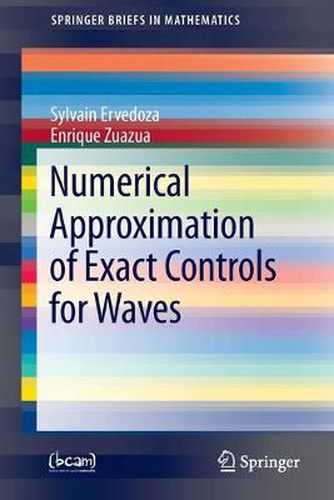Readings Newsletter
Become a Readings Member to make your shopping experience even easier.
Sign in or sign up for free!
You’re not far away from qualifying for FREE standard shipping within Australia
You’ve qualified for FREE standard shipping within Australia
The cart is loading…






This title is printed to order. This book may have been self-published. If so, we cannot guarantee the quality of the content. In the main most books will have gone through the editing process however some may not. We therefore suggest that you be aware of this before ordering this book. If in doubt check either the author or publisher’s details as we are unable to accept any returns unless they are faulty. Please contact us if you have any questions.
This book is devoted to fully developing and comparing the two main approaches to the numerical approximation of controls for wave propagation phenomena: the continuous and the discrete. This is accomplished in the abstract functional setting of conservative semigroups.The main results of the work unify, to a large extent, these two approaches, which yield similaralgorithms and convergence rates. The discrete approach, however, gives not only efficient numerical approximations of the continuous controls, but also ensures some partial controllability properties of the finite-dimensional approximated dynamics. Moreover, it has the advantage of leading to iterative approximation processes that converge without a limiting threshold in the number of iterations. Such a threshold, which is hard to compute and estimate in practice, is a drawback of the methods emanating from the continuous approach. To complement this theory, the book provides convergence results for the discrete wave equation when discretized using finite differences and proves the convergence of the discrete wave equation with non-homogeneous Dirichlet conditions. The first book to explore these topics in depth, On the Numerical Approximations of Controls for Waves has rich applications to data assimilation problems and will be of interest to researchers who deal with wave approximations.
$9.00 standard shipping within Australia
FREE standard shipping within Australia for orders over $100.00
Express & International shipping calculated at checkout
This title is printed to order. This book may have been self-published. If so, we cannot guarantee the quality of the content. In the main most books will have gone through the editing process however some may not. We therefore suggest that you be aware of this before ordering this book. If in doubt check either the author or publisher’s details as we are unable to accept any returns unless they are faulty. Please contact us if you have any questions.
This book is devoted to fully developing and comparing the two main approaches to the numerical approximation of controls for wave propagation phenomena: the continuous and the discrete. This is accomplished in the abstract functional setting of conservative semigroups.The main results of the work unify, to a large extent, these two approaches, which yield similaralgorithms and convergence rates. The discrete approach, however, gives not only efficient numerical approximations of the continuous controls, but also ensures some partial controllability properties of the finite-dimensional approximated dynamics. Moreover, it has the advantage of leading to iterative approximation processes that converge without a limiting threshold in the number of iterations. Such a threshold, which is hard to compute and estimate in practice, is a drawback of the methods emanating from the continuous approach. To complement this theory, the book provides convergence results for the discrete wave equation when discretized using finite differences and proves the convergence of the discrete wave equation with non-homogeneous Dirichlet conditions. The first book to explore these topics in depth, On the Numerical Approximations of Controls for Waves has rich applications to data assimilation problems and will be of interest to researchers who deal with wave approximations.